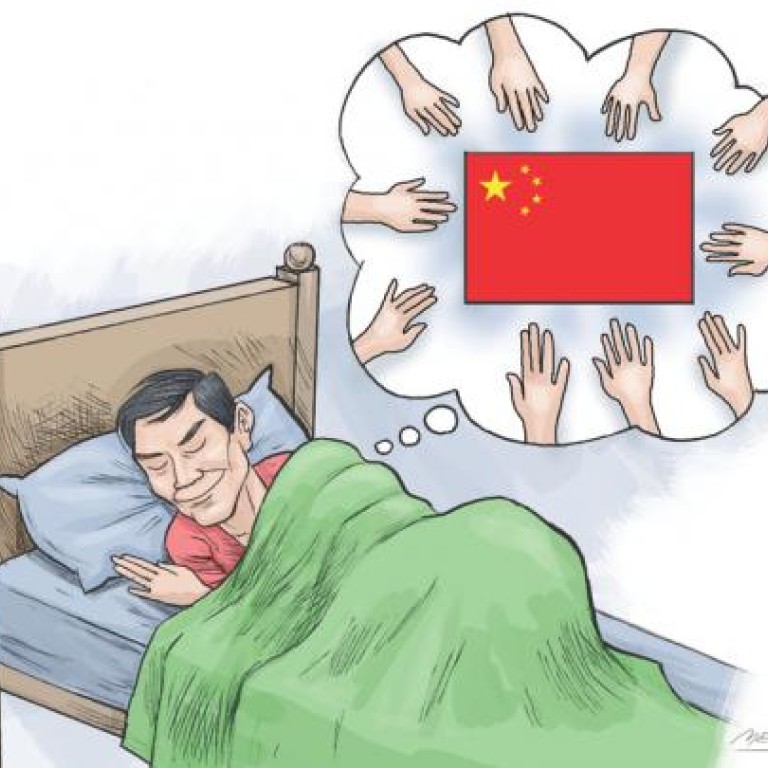
The China Dream is not so elusive
Andrew Leung says the China Dream, which carries the seeds of a model of society predicated on an engaged citizenry, is proving to be an inspiration to the nation, and is by no means unattainable
Last November, Communist Party secretary Xi Jinping evoked the "China Dream" during a visit to the National Museum of China's "Road Towards Renewal" exhibition in Beijing. The phrase went viral on China's weibo and drew a spate of emotional patriotic outpourings from overseas Chinese.
Since then, commentators have been trying to interpret Xi's vision, ranging from a mundane call for solving China's problems, to an image of a sublime renaissance comparable to China's ancient glories or Europe's Age of Enlightenment. In any case, Xi was speaking of a "China Dream" for the nation collectively, not a "Chinese Dream" in the sense of the good life of the "American Dream".
The yearning for epochal change is in the air among the top leadership. Since Xi became party secretary, he has launched a high-profile battle against official corruption and extravagance, calling for closer bonds between the party and the people, and efforts to uphold the rule of law and ideals enshrined in the constitution.
Cold water was poured on Xi's reformist rhetoric by some articles in the Western press. Xi's fight against corruption and inequalities is pitted against opposition from vested interests. His demand for constitutional checks is contrasted with his warning about the collapse of the former Soviet Union. His call for political liberalisation is cited with his approbation of Mao Zedong's revolutionary socialism.
The confusion is largely a product of binary thinking - either give up single party leadership or sclerosis; either Western democracy or risk of a "French Revolution"; either forward to the future or retreat to Maoism. In fact, the apparent contradictions are signs of a continuing quest for China's unique model of democracy. Indeed, in enlightened intellectual debate within the party, the original Paris Commune is considered a form of local democracy and Mao's revolutionary "mass line" as embracing the will of the "grass roots" against social injustice.
Not many in China believe the country's future lies in copying Western multiparty "confrontational" democracy, with all its recent fault lines. But how to make the party truly representative of and accountable to the people within a one-party state continues to test the ingenuity of the leadership.
For starters, China is likely to change the household registration system and promote civil society to monitor local governance. Another pointer to feasible change was a succinct, down-to-earth, 10-year road map for China's social and political development provided by Professor Yu Jianrong of the Chinese Academy of Social Sciences. This includes a less locally biased judiciary, abolition of authoritarian organs such as "labour re-education camps", and more governance transparency, including declaration of officials' assets. Indeed, some of these measures are brewing, if not already being experimented with.
However, as China vows to realise a middle-income society by 2030, it is timely to revitalise the party by invoking a grand renewal reminiscent of what captivated the entire people at the founding of the People's Republic. In a thought-provoking book, , Lin Chun evokes the vision of " (middle-income) socialism" with empowered local citizenry. Her thoughts resonate with a popular nostalgia for ideals of the Communist Revolution "where its government was clean, its army was the model of serving the people, its working men and women were dignified, and its life was meaningful without commodification and consumerism".
Moreover, in the age of scarcity and environmental strains, it is possible to envision an epochal transition from an "industrial" to an "ecological civilisation", in the words of Pan Yue, now the vice-minister of environmental protection. Less can be more.
Indeed, local citizenry has recently been allowed to succeed in reversing major municipal projects on environmental grounds. Citizenry empowerment in the workplace is also being quietly promoted.
It has often been said that with the one-child policy, China will get old before it gets rich, as the pool of low-wage workers is being exhausted. However, thanks to an annual output of eight million university and community college graduates, China will have 195 million of them by 2020, more than the entire US workforce today.
In a survey in May last year, conducted by the audit firm KPMG, most of the people polled expected China to rival the US in innovative technologies, particularly in cloud computing and mobile telephones, in the next four years. Likewise, Clyde Prestowitz, president of the Economic Strategy Institute, anticipates the rise of a "Silicon China".
Nevertheless, many institutional bottlenecks and other challenges remain, such as resource scarcity, demography and vested interests. What is even more crucial, however, is whether China could craft a new "social contract" that can harness a democratically organised citizenry to aid, monitor, participate in and hold accountable a clean and effective state that delivers the greatest public goods for the greatest proportion of the people.
Notwithstanding the odds, a visionary China Dream never fails to inspire and rally people. According to the , a 27-year-old double-major from Yale is giving up a lucrative career overseas to work as a lowly paid official in a remote village in Hunan province. As a Chinese, he vows to give his share to help fellow villagers seek a better life for themselves and their offspring.
The hearts and minds of the whole nation are now being touched by Xi's "China Dream", and the inspiring vision, imprecise though it is, does not look wholly unattainable.
Alexis de Tocqueville's is a critique of how liberal and egalitarian revolutionary ideals could become corrupted and forgotten afterwards. The classic tome has been reported to be doing the rounds among China's top leaders and is now a best-seller in China.
When asked by Richard Nixon what impact the French Revolution had had, then premier Zhou Enlai was reported to have said that it was too soon to tell. Perhaps he was right all along.

